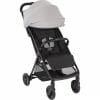Parenting
Reasons To Avoid Alcohol Consumption While Nursing
After abstaining from alcohol for nine months during pregnancy, it’s tempting to indulge in a glass of wine now that your little one has arrived. Having no more than a single drink is unlikely to harm your breastfeeding baby. However, there are other considerations to keep in mind before raising a toast. Before you decide to imbibe, let’s explore the recommendations from experts.
Can alcohol be transferred to my baby through breastfeeding?
The concentration of alcohol in your breast milk reflects the level of alcohol in your bloodstream. For alcohol to potentially cause drowsiness in your baby, your blood alcohol levels would need to reach 300mg/100ml. To put this into context, in England, a blood alcohol level of 80mg/100ml would result in failing a police breath test.
The quantity of alcohol you consume directly influences how long it remains in your system. While a single drink would typically be metabolized within two to three hours, consuming four drinks may take between nine to ten hours. Alcohol levels peak in the bloodstream around 30-60 minutes after consumption, or 60-90 minutes if taken with a meal.
This information is crucial when planning to drink around your baby’s feeding schedule. Initially, mothers dealing with cluster feeding may find this a challenging task, but as your baby grows, predicting feeding times becomes more manageable.
How does alcohol consumption affect a breastfeeding baby?
Various studies have explored the negative repercussions of alcohol consumption on infants. Short-term effects observed in babies whose mothers consumed moderate amounts of alcohol included increased crying, heightened alertness, and disruptions in sleep patterns. Long-term consequences encompassed impaired motor skills, cognitive development, and compromised immune function.
Your baby’s age and health status also impact how alcohol affects them. Newborns process alcohol at a much slower rate compared to adults, metabolizing it at only 25-50% of an adult’s pace due to their underdeveloped livers. If your baby has any underlying health issues, it’s advisable to consult a healthcare professional before consuming alcohol.
Given the severity of these potential effects, mothers who regularly consume excessive amounts of alcohol are urged to seek medical guidance to determine the best feeding approach for their baby.
Is the “pump and dump” method effective?
Contrary to common beliefs, the “pump and dump” strategy does not lower the alcohol content in breast milk since it cannot eliminate alcohol from your bloodstream. Only time can help in reducing alcohol levels in your body. However, pumping to alleviate engorgement or discomfort is recommended for your comfort.
Does alcohol consumption impact milk production?
Dispelling the misconception that alcohol enhances milk production, research indicates the opposite. Even small alcohol intake can diminish milk production and influence your let-down reflex. This is particularly noteworthy if your baby is struggling with weight gain issues.
Expert recommendations
Planning is key to responsibly enjoying a small amount of alcohol while breastfeeding. Dr. Jack Newman, the author of “More Breastfeeding Myths,” advocates, “Reasonable alcohol consumption should not be discouraged at all… Prohibiting alcohol unnecessarily restricts the lives of nursing mothers.”
Understanding the acceptable limits of alcohol intake while nursing is crucial. Consuming excessive alcohol can lead to negative and potentially hazardous consequences. To minimize risks significantly, wait until your baby is at least 8 weeks old, stick to the recommended limits, and allow a minimum of 2 hours to pass after consuming alcohol before breastfeeding.



















